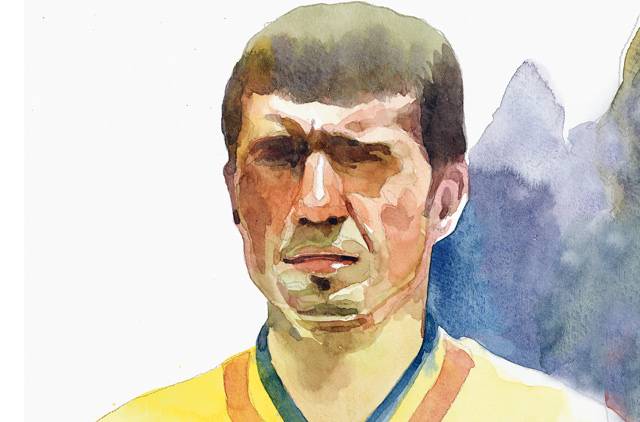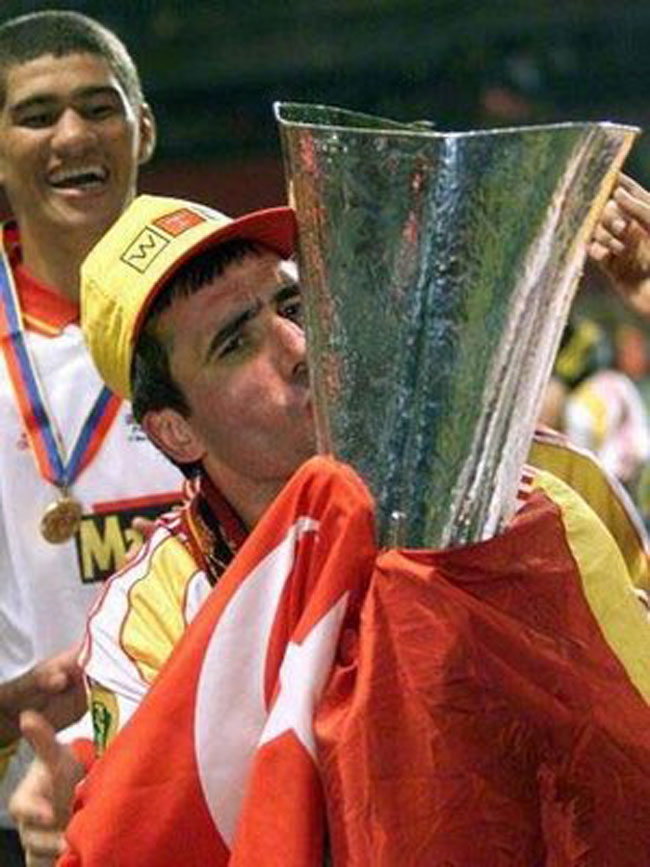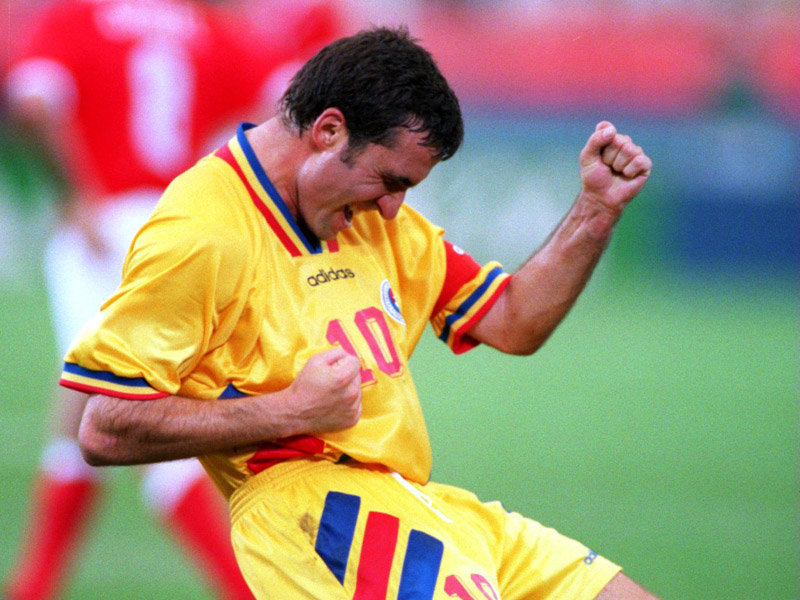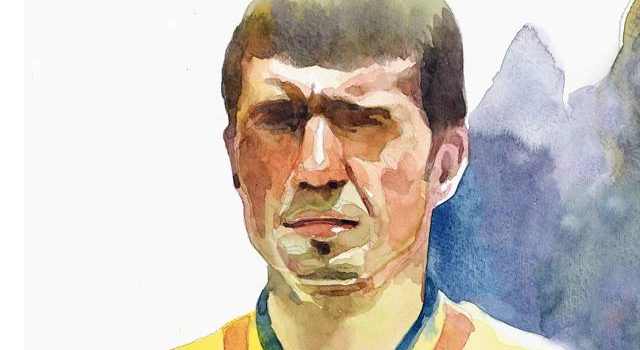
Short summary
The article presents the career of one of the greatest Romanian football players of all time in detail. Gheorghe Hagi was Romania’s best scorer and the national team’s leader during its most fruitful period. He played for top teams like Real Madrid and F.C. Barcelona.
Also, Hagi became Turkey’s hero after leading Galatasaray Istanbul to the all-time best performance in Turkish football: winning the UEFA Cup. The article includes a chapter on the player profile, depicts his activity after ending the football career and discloses some of his personal preferences.
Long summary
Every country has a huge talent, a symbolic football player within one generation. Zinedine Zidane was France’s football player of the ’90s, Raúl González was Spain’s football player of the ’90s, Del Piero is a symbol of Italian football and Romário is a symbol of Brasil in the’ 90s. Who was Romania’s symbolic football player in the ’90s?
Beginnings
Gheorghe Hagi was born on May 2, 1965, in Săcele, Constanța. His parents were Macedonian farmers. Little Gheorghe was declared the most technical football player of the Hope Cup and his name appeared in “Sportul” newspaper on September 7, 1976. Hagi played for the junior team under sixteen (four matches), for the junior team under seventeen (13 matches, 1 goal), for the junior team under eighteen (32 matches, 9 goals) and for the Olympic team (four matches). His first coach was Iosif Bükössi.
Club and national team career
Hagi started playing for F.C.Farul Constanţa (1982-1983), scored 7 goals and then moved to Sportul Studenţesc (1983-1987), where he scored 58 goals. Gheorghe Hagi started playing for the national team at the age of 18, in a friendly match against Norway, in 1983 (0-0).
Hagi was loaned to Steaua București in 1986, after the Romanian team won the European Champion Clubs’Cup in 1986. Steaua București (“Steaua” meaning “The star”) is the Army football team, was and still is the most prestigious Romanian football team. Hagi scored 76 goals in 97 matches and won three national championships and three national cups while playing for Steaua.
Hagi won the 1987 UEFA Super Cup (1-0, against Dynamo Kiev), scoring the decisive goal. Gheorghe Hagi was the leading scorer (four goals) in the 1988 European Champion Clubs’ Cup (he was equal to five other players). The owner of Panathinaikos wanted Hagi so bad in 1988 that he offered 8 million dollars to the dictator Nicolae Ceaușescu to allow the transfer to Panathinaikos, but the communist leader refused.
He considered the valuable football players as national values and did not allow them to leave the country until “they had done their duties” to Romania. Some of the football players left Romania illegally (Miodrag Belodedici - Red Star Belgrade, Marcel Răducanu - Borussia Dortmund), others continued to play in Romania in spite of the considerable offers from major clubs (Ion Voinescu - Arsenal Londra, Vasco da Gama, Florea Dumitrache - Juventus Torino, Nicolae Dobrin - Real Madrid, Cornel Dinu - Bayern München, Ilie Balaci - A.C. Milan, Rodion Cămătaru - F.C.Kaiserslautern, Benfica Lisabona).
While other Romanian football players were allowed to leave abroad at the end of their careers (Rodion Cămătaru - Charleroi, Boloni -Racing Jet de Bruxelles, Tudorel Stoica - Lens, Victor Pițurcă - Lens). Steaua reached the 1989 European Champion Clubs’ Cup final (lost 0-4 to Milan).
After Romanians gained their liberty in the 1989 Revolution, Hagi was transferred to Real Madrid for 4.3 million dollars, where he played for two seasons (1990-1992) scoring 15 goals.
From there, he joined Brescia (1992-1994), helping the team to return to the first division (Serie A) scoring another 15 goals in the process.
Hagi led Romania in the 1984 UEFA European Championship and the 1990 FIFA World Cup and then he achieved the greatest performance in the whole Romanian football history, namely acceding to the 1994 World Cup quarter-finals in United States. He scored three times there, including a brilliant lobbed goal from 40 meters against Colombia.
Hagi’s goal against Colombia (3-1) was also voted the fifth in a poll hosted on FIFAworldcup.com, gathering 9,297 votes. There were 341,460 votes online from over 150 countries worldwide for the greatest goal ever scored in FIFA World Cup history. Romania lost on penalties to Sweden (2-2, 4-5, after penalty kicks) in its 1994 World Cup final match. Hagi was the fourth football player in the world in 1994 (50 points), according to FIFA. He was selected in the 1994 FIFA World Cup All-Star Team.
Hagi’s performances attracted F.C.Barcelona’s interest and the Spanish club transferred him for 3 million dollars. Hagi scored 7 goals for Barcelona in two years (1994-1996), winning a second Spanish Super Cup for his team.

Hagi with the 2000 UEFA Cup trophy.
Hagi joined Galatasaray (1996-2001), where he won four championship titles (1996, 1997, 1998, and 1999) and two national cups (1999, 2000). He scored 50 goals in 132 matches for his team. Gheorghe Hagi became Galatasaray’s leader and won the UEFA Cup (1999-2000) in a penalty shootout against Arsenal. Galatasaray Istanbul became the first Turkish team to win a major continental trophy and Hagi was the hero. Three months later, Galatasaray won the European Super Cup (2000), defeating Real Madrid.
Adrian Păunescu, a poet, convinced Hagi to return to the national team in an emotional and carefully prepared TV show in 1999, one year after his retirement. Hagi was cheered by his fans at three o’clock in the morning. It was a night to be remembered… Hagi retired in 2001 after 125 caps.
Player profile
Style
Gheorghe Hagi was a great leader on the pitch, blessed with sublime vision, a creative, ingenious and precise passing ability, a disconcerting dribbling and an outstanding ball control. He was a greatly feared shooter from any distance and position. He also had a fine free kick technique. Hagi wore number ten.
Fair play
Although Hagi was mostly fair and disciplined player throughout his career, he was eliminated several times in the final years of his career, including during some important games like the final of the 2000 UEFA Cup against Arsenal, in extra time, when playing for Galatasaray (won 0-0, 4-1) (94 minute) and the 2000 European Championship quarter-finals, when playing for Romania (lost 0-2 to Italy).
He also attacked a Turkish referee in 2001, leading to a lengthy suspension (six matches) (Galatasaray- Gençlerbirliği SK 2-1).
Various records
Hagi was the top scorer in 1984-1985 season and then again in 1985-1986 season. He scored 141 goals in 222 matches in domestic games (0,63 goals per game). His domestic record is only second to Dudu Georgescu (Dinamo Bucureşti), who held the record (47) for goals scored in one season for a long period (1977-2012, which was eventually surpassed by Lionel Messi- 50 goals) and who also won the European Golden Shoe in 1975- 33 goals, who bagged 252 goals in 370 matches.
Hagi’s percentage (0,63 goals per game) is very close to Dudu Georgescu’s percentage (0,68 goals per game), a very rare performance for a midfielder. Hagi was declared the best Romanian football player of the year seven times (1985, 1987, 1993, 1994, 1997, 1999, and 2000). He has also scored 32 goals in 95 games in European Cup tournaments.
As an offensive midfielder, Hagi compensated for the weakness of the Romania national team’s attack in many cases. A midfielder is rarely the top scorer yet Hagi surpassed the very durable record of Iuliu Bodola, a football player of the ’40s (1939, 30 goals, 48 matches) in 1997 and still holds the first position (35 goals), which Adrian Mutu equaled in 2013.
Gheorghe Hagi played in three World Cups (1990- Italy, 1994- United States, 1998- France) (equalling the old national record of Nicolae Kovacs, present in the World Cup Final Tournaments in 1930, 1934, 1938 and playing 12 matches) and in three European Championships (1984- France, 1996- England, 2000- Belgium and Netherlands).

Gheorghe Hagi also surpassed Boloni‘s record for caps (108 matches for the national team) which had lasted ten years (1988-1998). Hagi holds the second place (125 caps) after Dorinel Munteanu (134 caps). Hagi led Romania 65 times (continuously 1990-2001), holding the present record (the next one is Cristian Chivu, Internazionale Milano, 50 times).
Post-football career
Hagi coached the Romania national team, Bursaspor, Galatasaray (twice), FC Politehnica Timişoara and Steaua București. He won a National Cup as Galatasaray’s coach in 2005. He founded “Academia de Fotbal Gheorghe Hagi” (Gheorghe Hagi Football Academy) for training football talents and also founded Viitorul Constanţa, which promoted to the First Division in 2012.
Beside his coaching activities, Hagi is a businessman, he owns the four stars Iaki Hotel in Mamaia. In addition, Hagi is National Goodwill Ambassador for UNICEF Romania, supporting children in difficulty.
Private life
Hagi is married for the second time. His first wife was Leni Celnicu (1990-1995) and he is now married to Marilena Vlahbei, Gheorghe Popescu’s sister. He has two children from the present marriage, Kira (15 years old), who has humanist inclinations, and Ianis (13 years old), who plays football. Hagi has two older sisters, Sultana and Elena.
Gheorghe Hagi is a close friend of another great Romanian football player, Gheorghe Popescu, who was FC Barcelona captain. Hagi enjoys listening to Elvis Presley, the Beatles and Mariah Carey. He likes Johan Cruijff as a football player and coach, J.F. Kennedy as a politician and Napoleon as a historical figure.
His favorite actors are Al Pacino and Michelle Pheiffer. Hagi likes eating macaroni and drinking red wine and prefers Hugo Boss clothes and BMW cars.
Conclusion
“Maradona of the Carpathians”, as Gheorghe Hagi is sometimes called, is a hero in Romania and Turkey alike for helping both countries decisively establish their greatest national or club performances. The Romanian Football Federation declared in 2008 that Hagi is the most valuable Romanian football player in the last 50 years.
Miodrag Belodedici (the Romanian football player with the best club success, namely that he won the European Champion Clubs’ Cup twice, in 1986 with Steaua București and in 1991 with Red Star Belgrade), Gheorghe Popescu (winner of the 2000 UEFA Cup with Galatasaray, was also Barcelona captain in the 1996-1997 season) and Cristian Chivu (winner of the 2010 Champions League with Inter Milan) are the other Romanian football players with international performances.
“The King”, as some people called Gheorghe Hagi, is one of the most popular Romanian sport players abroad, along with the great gymnast Nadia Comăneci and the tennis player Ilie Năstase of the ’70s, and along with football players Adrian Mutu and Cristian Chivu of the present generation.
Written by Vladimir-Adrian Maftei
Like O-Posts on Facebook
You can also follow O-Posts on Twitter @OPosts

